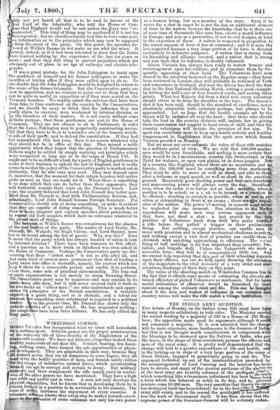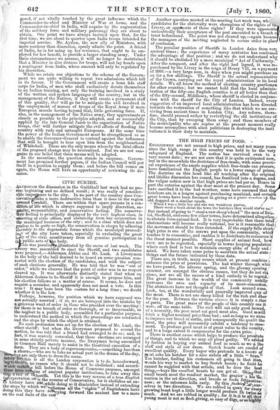THE INDIAN ARMY QUESTION.
THE debate of Monday on the Indian Army Bill must have beteg in many respects satisfactory to both sides. The Ministry carried the second reading by a majority of 229 in a House of 335 Menar hers; the opposition made good its arguments although it could not command a majority. It is now admitted that the change will be more expensive, more burdensome to the finances of India, but that is not thought worth consideration in comparison with the blessings to be showered upon the Natives of India, who pay the taxes, in the shape of those considerate persons the officers and men of the royal army. It is pretty well demonstrated that the change will lead to a greater expenditure of life and health, and to the locking-up in ships of a very large portion of the army of Great Britain, epgaged in perpetually going to and fro. The argument furbished up out of the insubordination provoked by the mismanagement of Lord Canning and the lawyers has bee-se torn to shreds, and many of the stoutest partizans of the abo'selth,! of the local army are heartily ashamed of the proffigateilrb'':rjay which something like a treasonous indictment has been
being
musters me 16,000 men. The very assertion that thatieg the signa-
ture
a force which has behaved so nobly in its day, and ny, addressed so has destroyed itself has been refuted; for in the first rnke cf army still exists, and in the second the mutila n it suffered was the work of Government itself. It has n shown that the supreme power of the Governor-General will be seriously endati- gered, if not vitally touched by the great influence which the Commander-in-chief and Minister of War at home, and the Commander-in-chief in India, will acquire by the augmentation of the military force and military patronage they are about to obtain. One point we have always insisted upon that, for the first time, we are about to quarter upon India troops intended for imperial service. Mr. Ayrton, the new ally of Ministers, with more candour than discretion, openly admits the point. A friend of India, he is for using up her revenues, that ought to be em- ployed for her benefit, to provide a larger standing army. Under these circumstances we assume, it will no longer be maintained that a Minister in dire distress for troops will not lay hands upon a contingent from India, whose amount ;rill only be regulated by his discretion.
While we retain our objections to the scheme of the Govern- ment we are quite willing to repeat two admissions which tell in its favour. If the Government will create a bona fide staff corps for India, of men who shall exclusively devote themselves to an Indian training, not only the training involved in a study of the written and spoken languages of the country, but in the management of the Natives, if they will create a permanent staff of this quality, that will go far to mitigate the evil involved in the employment of masses of troops of the Royal Army if mere European muscle having beyond that, little governing force. If, also, in the management of the Native army, they approximate as closely as possible to the principles adopted, and so successfully applied by the late General Jacob to the organization of Native troops, that will further mitigate the evil effects of flooding the country with rude and untaught Europeans. At the same time the power of the Indian Government must be strengthened so as to enable the Governor-General to contend against the influences that will be brought to bear upon him from the neighbourhood of Whitehall. These are the only means whereby the fatal effects of the proposed change may be neutralized. But we are not san- guine in our belief that these means will be adopted. In the meantime, the question stands in suspense. Govern- ment has promised further papers, if the Indian Council will put itself in a position to supply them ; and before the bill comes on again, the House will have an opportunity of reviewing its de- won.



























 Previous page
Previous page